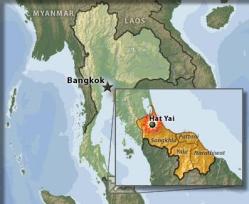| Recently,
a member of Hizbul
Mujahideen founded by the head of the Jamaat ut-Dawa in Kashmir threw
a grenade into a mosque compound in Kashmir targeting a preacher of the
the Barelvi
strand of Islam killing
5. Showing the complexity of such religious motivated political fights
in S.Asia, within days a close
associate the leader of the Hizbul Mujahideen was killed in Lahore.
The Jamaat ud-Dawa has released a statement, claiming that Mujahid was
killed by three "terrorists". And although it is not certain Pakistan ’s
ISI would have been involved, a Kashmir activist in India , soon thereafter
admitted to a last months bombing.
A lot of questions remain about 'religious violence' especially, in Asia. For example, three days before the Sept. 19 military coup that ousted Thai Prime Minister Thaksin Shinawatra, six bombs exploded in the city of Hat Yai , in southern Thailand 's Songkhla province, killing four people. Among the dead was a Canadian schoolteacher, the first Westerner known to have died as a result of the ongoing violence in Thailand 's Muslim-dominated south. As for religious violence as such, it is important to look at what provides the legitimation for the violence. Often used as a tool by political elites, targets are frequently symbols of collective identity and third, rumors, often grotesque ones, playa major role in fomenting violence. Political Religious Violence in Asia P.1: However, the feeling of humiliation is the most common thread, it is critical to consider the economic, social, and political grievances, as originating causes of religious violence. When religion enters the mix however, emotional resonance of religious narratives, symbols, rituals, and their transcendental frames, makes the violent conflict become less susceptible to negotiation. But acts of terror can also function as "symbolic empowerment" of marginal men. Political Religious Violence in Asia P.2: |
While
early on we already researched ‘political religions’ like Fascism
andCommunism, it should not come as a surprise that ‘religious
discourse as such’, also, can empower, engender, or disrupt violence.
Political Religious Violence
in Asia P.3:
A jihad in Southern Thailand reportedly caused over 1,800 fatalities since October, 2004, as against 3,200 in India 's Jammu & Kashmir during the same period. Hopes that the ouster of the former Prime Minister, Mr. Thaksin Shinawatra, would bring down the temperature and bloodshed have been belied so far. There were reportedly 10 deaths on December 6, 2006, alone. Political Religious Violence in Asia P.4:
Political Extremism in S.Asia P.4: Recently three Christian militants were sentenced, and in a direct connection last year three beheadings. Thus recently: Indonesia and Conclusion. |
